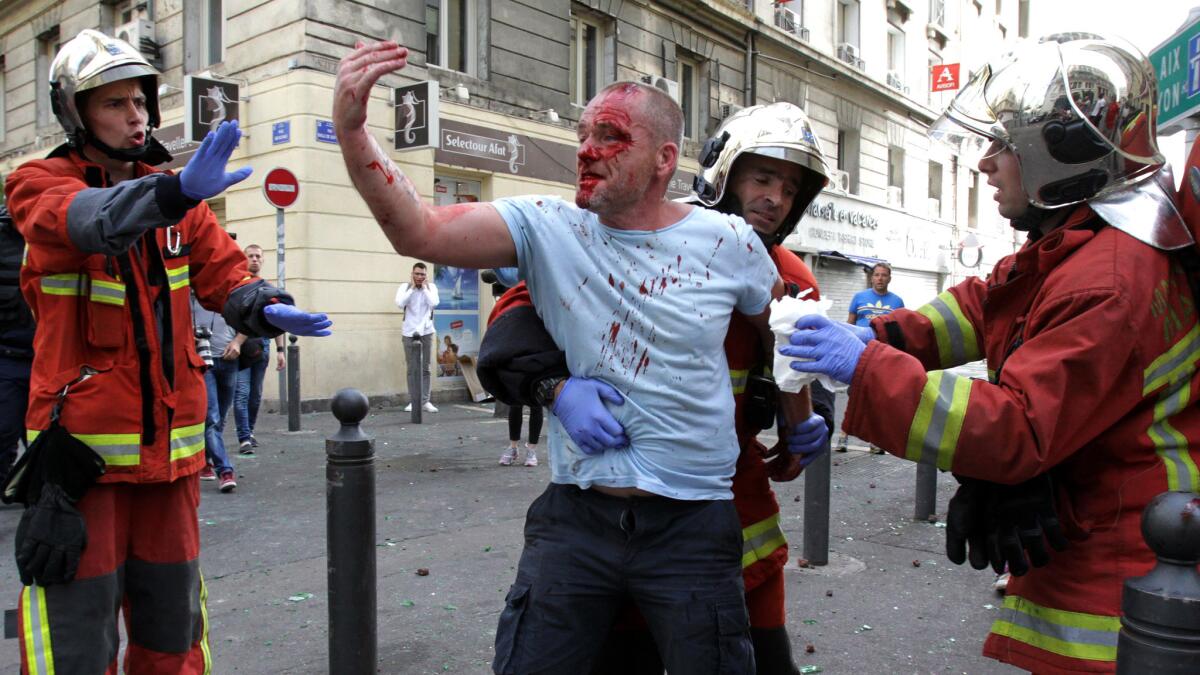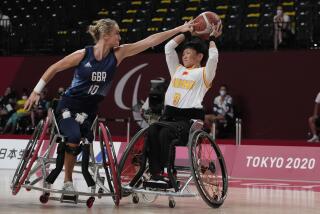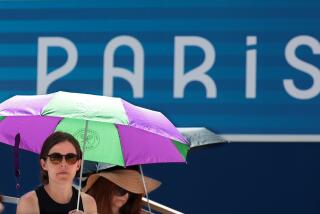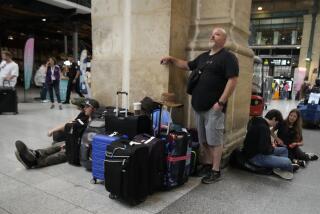Host France hoping Euros pomp can overcome circumstances

- Share via
Usually it’s love that’s in the air in Paris. But last week love was overwhelmed by the stench of rotting trash, the result of a garbage collectors’ strike.
Airlines pilots and rail workers also went on strike, crippling travel all over France – parts of which are still saturated by once-in-a-generation floods that caused the Seine to overflow its banks.
Then there’s the threat of terrorism just eight months after a series of attacks killed 130 people in the capital, and the presence of hooligans from Russia and England, who provoked violent weekend clashes with police in the Mediterranean port city of Marseille.
That’s the backdrop under which the European Championships kicked off its monthlong run last Friday in Paris. And those social and political issues have cast a pale over a tournament that, with 24 teams and 51 games, is the largest in Euros history.
The competition was expected to draw millions of fans to 10 French cities. But in recent weeks tourism industry representatives reported that up to 30% of hotel reservations have been canceled, according to the BBC. And government officials in Germany, Britain, the U.S. and elsewhere have cautioned their citizens about traveling to France.
The French, meanwhile, find themselves struggling to find a way to provide an environment that is both safe and celebratory, deploying more than 90,000 police, soldiers and private guards around stadiums, transportation hubs and at massive fan-fest events around the country.
In Paris alone a paramilitary force of 13,000 will patrol the city’s two stadiums and two fan zones, where state-of-emergency measures will give them additional powers to search and arrest people.
The soccer, however, will go on. To do otherwise, the French say, would allow the terrorists to win.
“Today, to have zero risk doesn’t exist, sadly,” said French Coach Didier Deschamps, who was on the sidelines at Stade de France in a north Paris suburb when the stadium was targeted by three suicide bombers last fall. “But we have to go forward and these Euros have to be a festival of football and the festival has to be as beautiful as possible.”
The weekly newspaper Journal du Dimanche echoed that sentiment in a recent Euros preview story headlined “A party despite everything.”
Fittingly, after overcoming so much just to get the tournament started, France is among the title favorites. Not only have the French won two of the three major post-war tournaments it has hosted – the 1984 Euros and the 1998 World Cup – but its deep, talented squad has won 10 of its last 11 games, a streak it lengthened with a 2-1 win over Romania in Friday’s Euro opener, played before a crowd of more than 75,000 in Stade de France.
The French also boast two of the Euros’ likely breakout stars in young midfielders N’Golo Kante of English Premier League champion Leicester City and Paul Pogba, who has won four consecutive Italian titles with Juventus.
But Les Bleus will have to overcome a deep field that includes seven of the world’s top 12 teams, led by No. 2 Belgium and reigning World Cup champion Germany, ranked fourth despite losing seven times since raising the trophy in Brazil two summers ago.
Also in the top 12 is sixth-ranked Spain, which is trying to become the first team to win three consecutive Euros; No. 8 Portugal, which reached the final eight of the last five Euros; and 11th-ranked England, which hasn’t won a major title since the 1966 World Cup.
The tournament is already making history. When Gareth Bale scored on a free kick in the first half of Saturday’s win over Slovakia, for example, it was the first goal for Wales in the finals of a major international competition in 58 years.
It’s also been 58 years since four nations from the British Isles have competed in the same major tournament. In 1958, it was England, Wales, Northern Ireland and Scotland. This time Scotland has been replaced by Ireland.
And the expanded field has made room for five first-time qualifiers – among them Iceland which, with fewer residents than Long Beach, will become the least-populated country to take part in a European Championship when it meets Cristiano Ronaldo and Portugal on Tuesday.
ESPN and ESPN Deportes are scheduled to devote 230 hours of live television to the event. And they, too, will be making history with former U.S. national team player Kate Markgraf becoming the first female match analyst to work a major men’s competition while her former teammate team Abby Wambach is making her debut as a studio analyst.
Tuesday’s game between Austria and Hungary is among the most compelling group-play matchups ESPN will be airing. The two imperial powers, which ruled a large chunk of Europe for half a century, who will be meeting for the 137th time on the soccer field; only Argentina and Uruguay have met more often.
Then there’s Thursday’s match between Germany and Poland featuring Poland’s Robert Lewandowski, who led the German Bundesliga in scoring this season, and Germany’s leading scorer, Lukas Podolski, who was born in Poland. Miroslav Klose, who retired from international play two years ago as Germany’s all-time goals leader, was also born in Poland.
More to Read
Go beyond the scoreboard
Get the latest on L.A.'s teams in the daily Sports Report newsletter.
You may occasionally receive promotional content from the Los Angeles Times.








